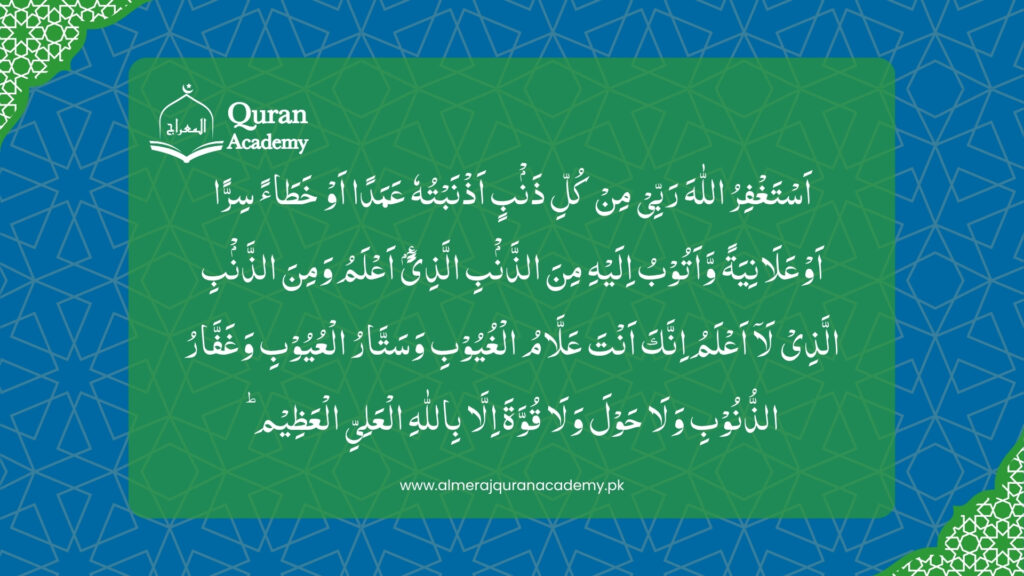Seeking forgiveness (repentance) is highly valued and always accepted by Allah سُبْحَانَهُ وَتَعَالَى.
The fifth Kalimah is a humble plea for forgiveness from Allah for all sins, whether intentional or unintentional.
The reciter believes Allah is All-Knowing and aware of all wrongdoings.
Allah conceals our sins from others and forgives those who sincerely repent.
True repentance must come from the heart with a commitment not to repeat sins.
Only Allah سُبْحَانَهُ وَتَعَالَى can guide us on the right path and help us perform good deeds.
Allah is the Greatest and deserves the highest respect and reverence.
Fifth Kalma
Kalima Astaghfar
The Fifth Kalimah, known as Kalima Astaghfar (كَلِمَاتْ إِسْتِغْفَارْ), comes from the Arabic word Astaghfar (استغفار), which means seeking forgiveness or repentance for mistakes and sins.
Each of the six Kalimahs serves a distinct purpose: for instance, the second Kalimah is for bearing witness (Shahadat), and the third focuses on praising Allah’s greatness. Similarly, the fifth Kalimah centers on repentance—asking Allah سُبْحَانَهُ وَتَعَالَى for forgiveness for any intentional or accidental sins committed by a person.
The core message of the fifth Kalimah is to sincerely apologize to Allah for past misdeeds. Allah appreciates true repentance and is always ready to forgive. This Kalimah also highlights Allah’s mercy, as He conceals our faults despite knowing them all. Genuine repentance must come from the heart, with a commitment to avoid repeating those sins. Regularly reciting the fifth Kalimah helps free us from past wrongs and grants us peace of mind.
Istighfar (Word of Penitence)
Astaghfirullah rabbi min kullay zambin aznabtuho amadan ao khat an sirran ao alaniatan wa atubu ilaihee min az zambil lazee aalamo wa min az zambil lazee la aalamo innaka anta allamul ghuyoobi wa sattaarul oyobi wa ghaffar uz zunoobi wala ha ola wala quwwata illa bila hil aliyil azeem
I seek forgiveness from Allah, my Lord, from every sin I committed knowingly or unknowingly, secretly or openly, and I turn towards Him from the sin that I know and from the sin that I do not know. Certainly You, You (are) the knower of the hidden things and the Concealer (of) the mistakes and the Forgiver (of) the sins. And (there is) no power and no strength except from Allah, the Most High, the Most Great
اَسْتَغْفِرُ اللّٰهَ رَبِّىْ مِنْ كُلِّ ذَنْۢبٍ اَذْنَبْتُهٗ عَمَدًا اَوْ خَطَاءً سِرًّا اَوْعَلَانِيَةً وَّاَتُوْبُ اِلَيْهِ مِنَ الذَّنْۢبِ الَّذِیْٓ اَعْلَمُ وَمِنَ الذَّنْۢبِ الَّذِىْ لَآ اَعْلَمُ اِنَّكَ اَنْتَ عَلَّامُ الْغُيُوْبِ وَسَتَّارُ الْعُيُوْبِ وَغَفَّارُ الذُّنُوْبِ وَلَا حَوْلَ وَلَا قُوَّةَ اِلَّا بِاللّٰهِ الْعَلِىِّ الْعَظِيْم

The Significance of Kalima Astaghfar - Fifth Kalma
Seeking forgiveness, or repentance, is an act deeply valued by Allah سُبْحَانَهُ وَتَعَالَى, who is always ready to forgive His believers. The fifth Kalimah represents a sincere plea from a person to their Creator, Almighty Allah, asking for forgiveness for all sins committed—whether intentional or accidental, public or private—with full faith that Allah will accept this repentance. The reciter acknowledges that Allah is All-Knowing and that He conceals our faults.
In this Kalimah, the believer admits Allah’s ultimate power and authority and trusts in His mercy to forgive. The key points of Kalima 5 include:
The believer humbly asks for forgiveness from Allah, recognizing that He knows all their wrongdoings, whether done knowingly or unknowingly.
The believer repents with confidence that Allah will accept their sincere apology.
The believer acknowledges that Allah is aware of everything but mercifully hides their sins from others and is the One who forgives all faults.
The believer also admits that only Allah can guide them on the right path, help them perform good deeds, and that He is the Greatest, deserving utmost respect.
Kalima Astaghfar – Core Beliefs:
Reciting Kalima Astaghfar – When & Where?
The Fifth Kalima can be recited anytime and anywhere without restrictions, but it is best done in private since repentance is a personal matter between the believer and Allah سُبْحَانَهُ وَتَعَالَى. The ideal time to recite it is whenever you feel sincere remorse for past sins and wish to seek forgiveness. It can be part of your daily routine or whenever you realize the need to repent, with the key being genuine awareness and commitment to change.
How Often Should We Recite Kalima Astaghfar?
Since the Fifth Kalima focuses on repentance, it should be recited with full awareness and purpose. You may recite it as often as you wish, ideally making it a regular part of your prayers. The condition is to be truly committed to avoiding the repetition of past sins. Reciting it along with the other Kalimahs multiple times daily is recommended. Following Sunnah, seeking forgiveness up to seventy times daily is encouraged.
Incorporate Kalima Astaghfar into Our Daily Life
Repentance (Astaghfar) plays a vital role in a believer’s life. Admitting sins before Allah سُبْحَانَهُ وَتَعَالَى is highly valued and can transform one’s life. It lifts the burden of past mistakes and helps keep a person on the right path, as taught in Islam. The Fifth Kalima is the best means to seek forgiveness and express repentance.
This Kalima embodies various acknowledgments, all aimed at seeking Allah’s forgiveness while recognizing His greatness. When our repentance is accepted, it has a deep and positive impact on our lives. Regular and sincere recitation helps us live according to the true example of a Muslim. The fundamental condition remains that we avoid repeating wrongful acts and strive to live sin-free.
Benefits of the Kalima Astaghfar Based on the Quran and Hadith
Repentance is a frequently emphasized topic in the Quran. For instance, the 3rd verse of Surah Hud highlights its importance:
Translation – And seek your Lord’s forgiveness and turn to Him in repentance. He will grant you a good provision for an appointed term and graciously reward the doers of good. But if you turn away, then I truly fear for you the torment of a formidable Day.
[Hud 11:3]
Similarly, the 52nd verse of Surah Hud urges:
Translation – And O my people! Seek your Lord’s forgiveness and turn to Him in repentance. He will shower you with rain in abundance, and add strength to your strength. So do not turn away, persisting in wickedness.
[Hud 11:52]
The 58th verse of Surah Al-Baqarah also stresses seeking forgiveness:
Translation – And ˹remember˺ when We said, “Enter this city and eat freely from wherever you please; enter the gate with humility, saying, ‘Absolve us.’ We will forgive your sins and multiply the reward for the good-doers.
[Al-Baqarah 2:58]
The 3rd verse of Surah An-Nasr also praises the act of seeking forgiveness:
Translation – then glorify the praises of your Lord and seek His forgiveness, for certainly He is ever Accepting of Repentance.
[An-Nasr 110:3]
Additionally, Hadith 6307 from Sahih Al-Bukhari narrates:
Translation – Narrated Abu Huraira: I heard Allah’s Messenger (ﷺ) saying.” By Allah! I ask for forgiveness from Allah and turn to Him in repentance more than seventy times a day.”
[Sahih Al-Bukhari 6307]
Thus, both Quran and Hadith clearly show that Allah سُبْحَانَهُ وَتَعَالَى loves repentance and forgives the mistakes of His believers. Therefore, recite the Fifth Kalima sincerely to receive Allah’s mercy and forgiveness.

